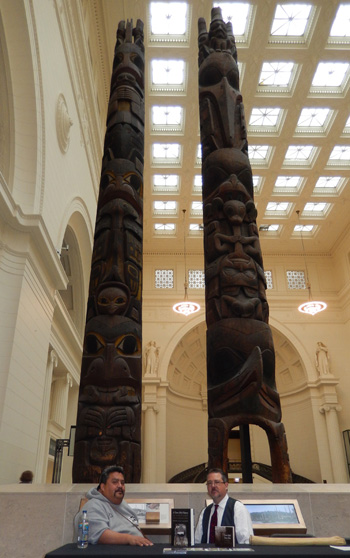 Southern Illinois University Edwardsville’s Gregory Fields, PhD, professor in the College of Arts and Sciences’ Department of Philosophy, has joined a prestigious group of tenured faculty members, achieving the University’s highest academic rank of Distinguished Research Professor.
Southern Illinois University Edwardsville’s Gregory Fields, PhD, professor in the College of Arts and Sciences’ Department of Philosophy, has joined a prestigious group of tenured faculty members, achieving the University’s highest academic rank of Distinguished Research Professor.
The distinction is awarded in recognition of significant contributions to research and creative activities. Fields is an active teacher-scholar whose work aims to help prevent the loss and neglect of indigenous languages, oral histories, literatures, philosophies and lifeways through active and scholarly engagement in the recovery and preservation of indigenous knowledge.
His research contributions incorporate content and methods from anthropology, history, philosophy, religious studies, ethnomusicology, languages and literature.
“Dr. Fields, through his multidisciplinary approach research, has produced an impressive body of work that preserves the language and culture of the Coastal Salish,” said Jerry Weinberg, PhD, associate provost for research and dean of the SIUE Graduate School. “His passion and expertise have earned him the trust and recognition of tribal elders, with whom he has worked directly, as well as national recognition among his peers. Dr. Fields, as an SIUE teacher-scholar, brings his remarkable work into his classes, which creates a richness to his teaching that is one of the hallmarks of SIUE.”
“It is a great honor to named among those colleagues whose work has been recognized by this award.” Fields said. “I will always be thankful to SIUE for making possible my work in Native American Studies and in digital humanities, areas of study that I am glad we can provide to our students. A faculty that is dynamic in research and creative activity creates a dynamic curriculum, and that is a major factor in SIUE’s being an outstanding university.”
Fields has given 41 conference presentations and is the recipient of more than $130,000 in grant awards. His current book project, the third in a trilogy representing three generations of Coast Salish culture bearers, has received support from the National Endowment for the Humanities.
 He is a prolific writer, among whose works are two books with National Heritage Fellow Pauline Hillaire (Lummi Coast Salish): “Rights Remembered: A Salish Grandmother Speaks on American Indian History and the Future” in 2016, and “A Totem Pole History: The Work of Lummi Carver Joe Hillaire” in 2013. For each book, Fields produced an audio CD and DVD companion volume, distributed by the book’s publisher, the University of Nebraska Press.
He is a prolific writer, among whose works are two books with National Heritage Fellow Pauline Hillaire (Lummi Coast Salish): “Rights Remembered: A Salish Grandmother Speaks on American Indian History and the Future” in 2016, and “A Totem Pole History: The Work of Lummi Carver Joe Hillaire” in 2013. For each book, Fields produced an audio CD and DVD companion volume, distributed by the book’s publisher, the University of Nebraska Press.
“Although recordings are no substitute for living teachers, they can advance cultural revitalization,” Fields explained. “Audio and video recordings offer a more culturally relevant means of preserving and transmitting the knowledge-systems of cultures that traditionally use the voice and the memory, rather than text, for this purpose. For research in fields such as linguistics, recordings have enormous value, especially as elder culture bearers and speakers of Native languages pass away.”
In 2017, Smithsonian Folkways Recordings released “Pacific Northwest Medicine Songs of the Four Seasons,” sung by Johnny Moses (Nuu-chah-nulth & Tulalip Coast Salish) and produced by Fields. The audio collection, nearly four hours of song and oral tradition, accompanied by a monograph and maps by Fields, will remain accessible in perpetuity.
Distinguished Professor of History at SUNY-Binghamton Thomas Dublin, PhD, noted, “Few scholars are able to present their work in such a distinguished venue, and at the same time, reach an extremely broad audience.”
“Fields has the best qualities of a scholar, and most importantly, he possesses endless curiosity,” added Atesh Sonneborn, PhD, associate director of the Smithsonian’s Center for Folklife and Cultural Heritage, who worked with Fields for a decade to produce the Native Northwest audio collection. “His methodological process is well-framed, he perseveres until the best is done and he’s rigorously self-disciplined. Dr. Fields’ body of work as a whole reveals profound dedication to the educational mission writ large.”
Fields was selected as one of 40 international scholars to serve as an editor for the online archive “Women and Social Movements in Modern Empire since 1820,” a resource that aims to help restore the voices of women to the study of history. For this publication, Fields produced an archive of interlinked multimedia and textual material for the section “Native Women in North America,” along with an interpretive article.
Fields has been recognized for his scholarship, leadership and teaching skills by being awarded the SIUE Hoppe Research Professor Award for 2013-15, the Organizational Leadership Award from the Center for Sustainability and Spirituality at SIUE in 2009, and the SIUE Teaching Distinction Award in 2007. In addition, Fields has demonstrated an exemplary dedication to service at SIUE as evidenced by his membership in more than 20 committees and councils.
Recipients of the Distinguished Research Professor honor are provided one semester of time devoted to research, along with a $1,000 increase in their academic year base salary. They also receive a medallion to be worn with their academic regalia, and their name is placed on a plaque displayed in Rendleman Hall on the SIUE campus.
Photos: SIUE College of Arts and Science’s Gregory Fields, PhD, has achieved the University’s highest academic rank of Distinguished Research Professor.
Lummi Coast Salish carver Felix Solomon (L) and SIUE’s Gregory Fields, PhD, (R) present at the Field Museum in Chicago. Photo credit: Jay Kemp, 2014